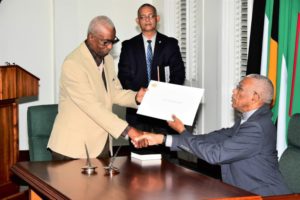
The Caribbean Court of Justice (CCJ), in accordance with Section 6(c) of the CCJ Act, Chapter 3:07, has granted leave to Peoples Progressive Party (PPP) Executive Secretary Zulfikar Mustapha to challenge the Guyana Court of Appeal’s decision to uphold the appointment of Justice (retd) James Patterson as Chairman of the Guyana Elections Commission (GECOM).
The Guyana Court of Appeal’s ruling, handed down on October 19, 2018, upheld the High Court’s ruling that President David Granger was well within his rights when he unilaterally appointed Patterson as GECOM Chairman.
Mustapha has been ordered to, within the next three months, lodge G$750,000 with the Supreme Court Registrar as security costs. Additionally, he would have to conform to the requirements of Rule 10.6 (2) (b) of the amended CCJ Rules by providing a list of documents which he proposes to be included in the Record of Appeal.
He is being represented by Attorney Anil Nandlall, while Government is being represented by Solicitor General Kim Kyte-Thomas.
Chief Justice Roxane George ruled on June 9 that the Constitution of Guyana allows for the President to unilaterally appoint someone to fill the position of Chairman of the Guyana Elections Commission (GECOM). Justice George’s ruling came after the Opposition People’s Progressive Party (PPP) had, on October 23, 2017, filed an injunction to have the court rescind the unilateral appointment of Justice (retd) James Patterson as Chairman of GECOM. The motion was filed in the name of PPP Executive Secretary and Member of Parliament Zulfikar Mustapha just days after President David Granger had made the announcement in regard to Patterson.
The Appellate Court’s unanimous ruling was handed down on October 19 by acting Chancellor of the Judiciary Justice Yonette Cummings-Edwards and fellow Appellate Court Justices Dawn Gregory and Justice Rishi Persaud. The Appellate Judges agreed with Justice George that Justice Patterson’s appointment was not unconstitutional. They said the President was empowered to appoint a Judge, retired Judge, or someone with the qualifications thereof if he deemed the Opposition Leader’s list unacceptable.
Opposition Leader Bharrat Jagdeo had sent to the Head of State three lists each comprising of six nominees he had proposed to be considered for the post of GECOM Chair, but this totality of 18 names was rejected by the President, who declared that the named persons were unacceptable. Justice Gregory, in her decision, observed that the manner in which the three lists were submitted did not achieve consensus.
Justice Persaud determined that any move towards unilateralism was wholly unacceptable, could lead to abuse, and would not be motivated by good faith. He, however, outlined that there was nothing to suggest that the President acted “unconstitutionally, illegally or unreasonably in appointing the retired Judge as GECOM Chair. “The appointment of a former Judge results itself in impartiality and fairness, and can only lead to establishing the intended balance prescribed for as a whole,” Justice Persaud had observed.
Chancellor Cummings-Edwards had declared that Mustapha’s case had no bearing in affecting the elections process, as the challenge to Justice Patterson’s appointment was filed well before the date before LGE was proclaimed.
The most senior Judge had, however, outlined that once the President found the list to be in what the framers of the Constitution opined as “not acceptable”, he could select a Judge, retired Judge or one that holds the relevant qualifications. Justice Cummings-Edwards in fact held the view that this decision was in keeping with the proviso to Article 161(2) of the Constitution. She declared that Justice George’s High Court decision upholding the appointment was correct. She had also observed that the retired Judge was qualified to serve in the chairman’s post, having served in the Commonwealth, with Guyana being included in this grouping.



